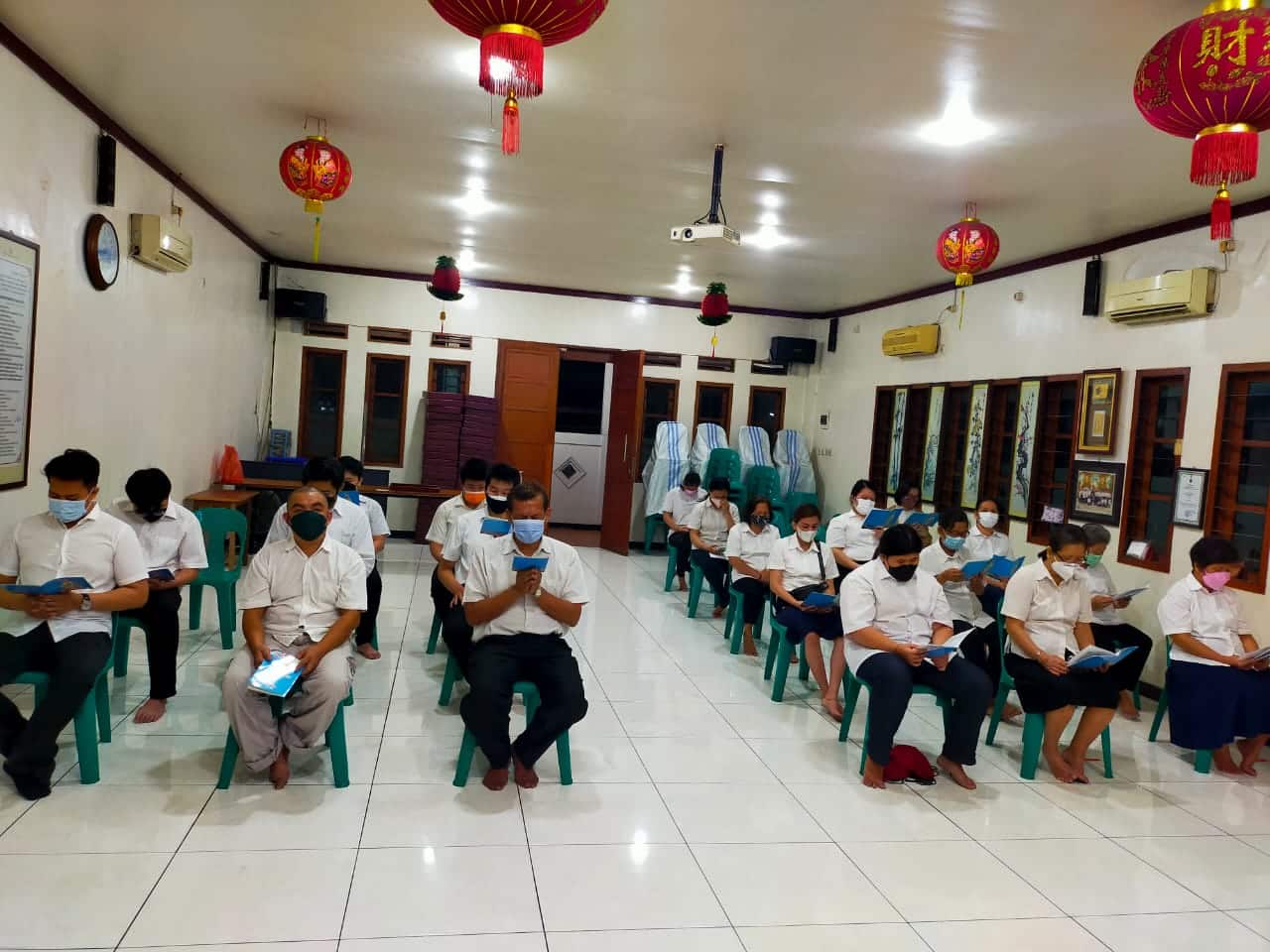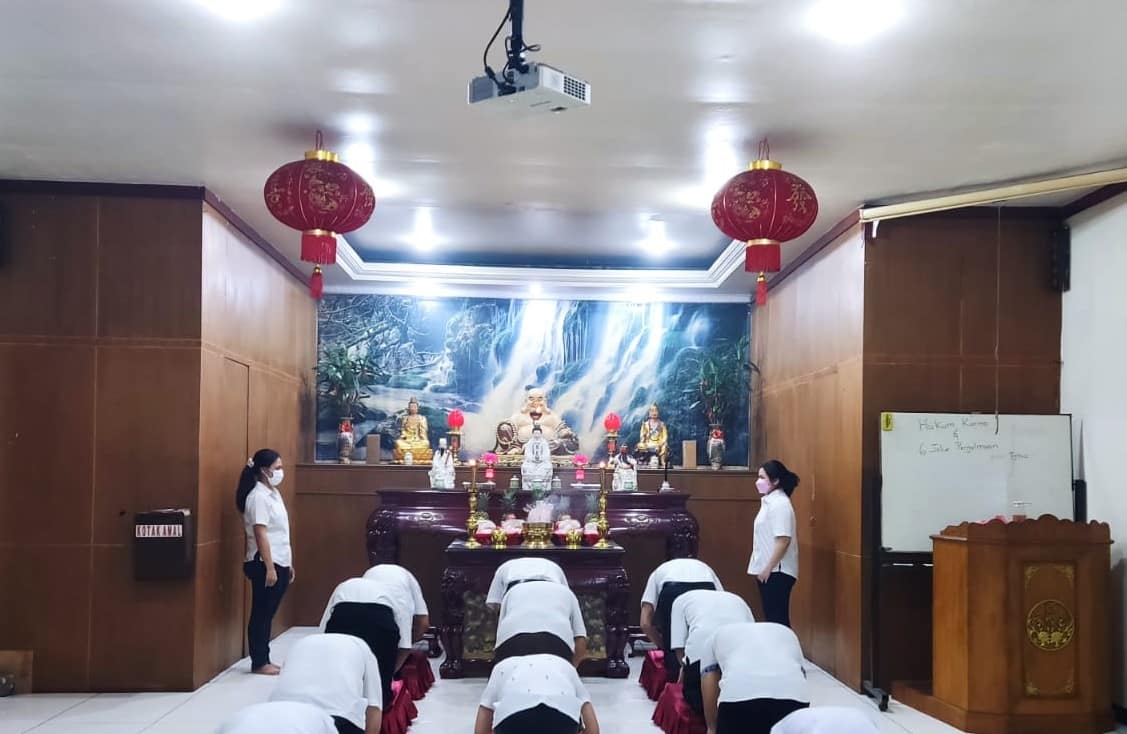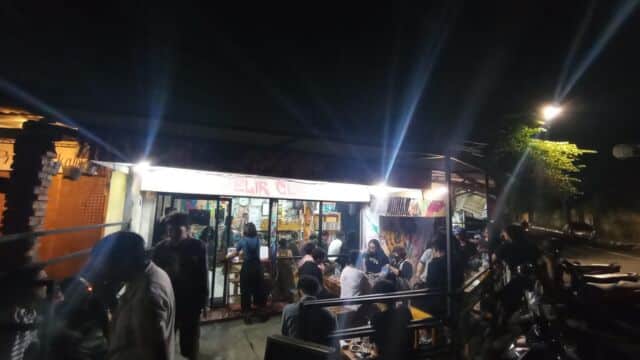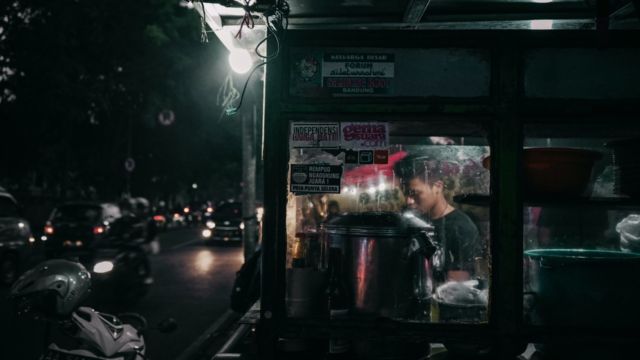On a Megacity’s Edge, a Place Where I Can Be Myself
Photo: Veronica Gabriella
Ce Te Temple | 2,517 words
Translated from Bahasa Indonesia by Lise Isles
The sky, lit up by sunset just before, has gone dark when I hear my mother call me from beyond the gate. Then the sound of a motorbike engine is turned on.
It’s almost 7pm. I hurriedly straighten my white dress shirt and head outside.
Today my mother and I will attend a Cap Go service as we always do, part of the customary prayers that happen during Chinese New Year. We’ll do so in the Ce Te Temple in Tangerang, on the outskirts of Jakarta. It’s not far from our place, only about two kilometres.
‘Don’t forget the donation money!’ my mother reminds me. I nod while patting the pocket of my black jeans, confirming we’re good to go. Energetically I get up onto the back of the motorbike seat, immediately behind my mother in the driver’s position, and we set off.
We drive through our housing complex, quiet and still at night. So much so that I can hear clearly meows of cats and the sobbing of a small child. When the scooter finally turns to enter the main road, though, everything gets far noisier. The roar of vehicle engines and honk of vehicle horns are as if competing to display impatience. The ‘tek-tek’ sounds made by spatulas working woks of nasi goreng; people yelling out to order a bowl of soto; a laugh from a rickshaw driver in front of a cheap no-frills eatery: all blend together as if to prove how much the city, far from quiet and still, comes to life even more at night.
After 10 minutes we arrive. The temple building sits right on the road’s edge, next to a dark, empty house whose yard has been turned into a parking-lot for trucks that transport giant bottles of water. Opposite is a row of street-carts hawking food, from crispy fried chicken, KFC-style, to char kway teow noodles.
I think that what happens here is more than just worship and prayer. This is also a place to cultivate and realize hope, together.
Surrounded by all this bustle stands Ce Te temple. After my mother parks the bike, we enter. It feels quite the contrast, once I’m inside. The noise from the street is immediately replaced by warm welcomes of the congregation, plus spiritual music played at low volume. Vehicle exhaust has disappeared and been replaced with the fragrant smoke of incense. I feel I’ve entered another dimension.
People sitting on chairs in neat rows on the left side of the hall greet me. I smile, bow three times in the direction of the altar, as a sign of respect, then go and join them.
This house of worship, a part of my life since I was little, has changed a lot, primarily after a renovation in 2009. I can remember how it was only a very makeshift building: now it’s got two floors. White paint, which represents the White Sun, now makes the space brighter. Excerpts from the sacred texts, plus a row of photos of the Elders and Great Elders, have been hung carefully on the walls. Because of the congregation’s assistance, provided in funds, energy, and time, this temple has been turned into a kind of home that we all own together.
As half past seven nears, more and more congregants arrive.

I always get a warm feeling when I’m here. Not only because this is God’s house, but also because here, people from various backgrounds – not caring whether poor or rich, working or schooling, old or young – must all set aside their egos, bow their heads, and acknowledge willingly that we are all equal in the eyes of God.
Aside from that, here I’m also more relaxed about being myself. This place doesn’t demand I have good test results, a decent job position or a dazzling salary. Instead I’m invited – invited, not pressured – to simply become better than I was the day before, to become the best version of myself that I’m capable of being. Here, I learn that if I go slowly it’s no problem, as long as I’m moving forward. That not all things in life should be rushed. That I’m not engaged in a sprint, but a marathon with many different phases before the final destination.
I think it’s these lessons which keep me returning. Here, I’m embraced and made to feel like a human again. Something that’s hard to achieve amidst a big city life where everything always has to be instant, a life which – sometimes unconsciously – compels me to turn into a robot obeying various deadlines and playing various roles. It makes me exhausted. But I can rest when I ‘come home’ to this place.
‘Today, after we prostrate ourselves in the kou shou, we’ll continue with the Pan Tao, invoking the Divine Path. Because among us right now are people who have been successfully invited to find their way to the Buddhas’, Than Zu, a temple leader, says to the congregation.
I nod while glancing over at the altar. There sit six statues of key Buddhas who became saviours: Buddha Maitreya, accompanied by Buddha Chi Kung and the Moon Goddess Yek Hui Phu Sa, together with Buddha Kwan Im, flanked by Buddha Kwan Kong and Buddha Li Lau Ta Sien.
Right in front of the altar stands Teacher Tian Chuan Se, wearing the grey robes typical of Chinese-Indonesian Buddhists.
‘With this, the names of these people today will be imprinted in Nirvana and revoked from the power of the kings of hell’, he says loudly. I’ve already heard these words many times, both when watching and participating in Pan Tao, but the magical effect is always the same. I get goosebumps, not because of fright, but because of something that touches my soul. The same is happening to the rest of the congregation sitting in witness – this imposing space suddenly turns serene.
‘Good: with this, the offering of fruit will soon begin…’ The voice of Than Zu, dressed in black and white, with a navy bow-tie, returns me from my wandering thoughts.
Smoke from incense wafts high into the air, dense around the altar and half the hall. Now comes the sermon.
I like to sit up the back on the right, close to the aisle. From here, I don’t merely get a good view of the preacher, including all the body gestures used when sermonizing, but can also witness the congregation’s responses.
Many listen seriously – they tend to be the elderly and parents. The behaviour of young people, meanwhile, teenagers and those in their early twenties, varies. Some of them are doing things like silently taking phones out of their pants pockets, glancing in the direction of friends and chuckling, and checking the wall clock over and over.
I want to go and sit down next to them and then, for a hoot, hiss, ‘Hey, you’re being watched, you know that, right?’ or perhaps ‘Helllllll-ooo – caught red-handed playing with phones in the sermon, I’m reporting you!’ Though of course I can’t do it: it’s not possible for me to stand and move in the middle of the sermon.
It can’t be denied, though, that this is an honest reaction from them, who are bored hearing stories of sinning or merit. I understand they’re just kids, and I myself can struggle with sermons that go round in circles or are too general. I think in future there needs to be more particularised sermons, with topics customized for listeners’ age and preferences, and also touching on current trends to be more relevant. Maybe something like, ‘is it possible for worship to be done in the metaverse?’
Still absorbed in my thoughts, which are going wild in all directions, I throw a smile at the altar. Calm gazes from the ranks of Buddha statues instantly greet me. Regardless of the hipness or boringness of any topic, I still appreciate every sermon that happens here. No matter what, they all contain the same call: to be good to others.
I also understand that every person comes to the temple with slightly different aims: to accumulate merit, to find a partner of the same faith, to search for good luck, up to attaining a higher spirituality by communication with God. Each congregant brings their own personalities to bear on the messages and activities here. But whatever drives them, they gather and become one at this temple.
I think that what happens here is more than just worship and prayer. This is also a place to cultivate and realize hope, together.
If you need friends to play sports with, a sports club is run out of this temple. If your hobby is cooking there’s a group of chefs here who share creative vegetarian recipes. If you’re interested in studying Mandarin, here a volunteer teaches a course. In what’s called an ‘angel class’, teenagers can become study mentors to small children. And many more. I see all this as a central task for a house of worship – to save people from feelings of loneliness and being alone. This temple is here not only for us to visit for a short time, but to be a home.
Around 9:30pm, proceedings begin winding up. The congregation are invited to take holy water and enjoy a vegetarian dinner. Faces become brighter: people can perhaps be more relaxed now, after either tensely listening to the sermon’s stories of retribution, or being bored by them.
Every person takes a plate and chooses their own dishes, spread out as a buffet, then eats while chatting.
‘You should boil kam cho – that’ll do it, that’ll relieve those symptoms. Makes for a stronger immune system, too’, one of a group of old ladies blurts out abruptly.
Some middle-aged women are gathered and having a lively conversation. Most of them are from families that work as hawkers, so the topics don’t wander far from food and their own enterprises. I know that several of them sell cake, cooked vegetables, and fried bananas.
‘Hey, can I ask, you just opened a cake stall in front of that Regensi market, right?’ says an ayi (aunt in Mandarin). ‘Is it a good spot?’
‘If you open that sort of resto, what time do you usually wake up to prepare the food? It must be the crack of dawn…’
Different to the female congregants, who usually chat in the kitchen, the male congregants stand separately out the front of the temple. I see middle-aged men together with teenage boys sitting on top of their motorbikes that are parked in the courtyard. Usually they will be laughing louder than the women, especially the young men who are enthusiastically discussing, and playing, mobile games together as they wait for their parents.
‘Your turn. Come on, gotta be quick if you don’t want to be attacked soon’, says one teen.
‘Yeah yeah – I know. But this mission has to finish to unlock the new feature.’ answers another, no less spirited. I think this is how they shake off the cobwebs after the long sermon earlier. As long as they’re not too loud and don’t disturb people, these kids are usually allowed to play their games like this after the main event is over.
I myself rarely discuss things other than religion if I’m at the temple. If I say something to my mother or another congregant, it’s not far from whether I can come to the next event, next week, or whether it’s possible for me to join the committee. Often the young people in the Education Club, who hold cool events for teenagers and young adults in their early twenties, entreat me to join them.

‘Ver, we’re going to make a Sunday School, yeah, at the end of this week. We’ll read the scriptures to the teens and little kids, you’ll join, right? You can be a mentor’.
‘Yeah, and also we want to shoot a video where people say “Happy Mother’s Day” in different languages, help us out, hey’.
‘Sounds good’, I say, ‘but I’ll have to check my work schedule first. I think there might be a clash’. Often I have to reject attending events if they’re happening at the same time as my office job or freelance gig responsibilities. One thing I appreciate is, although I often can’t participate, they never forget me or decide not to invite me. There’s never an assumption of ‘ah, can’t be bothered inviting Vero, she’ll just say she can’t come’. I’m always informed, and always welcomed if it ultimately turns out I can attend.
Amid this congregational chatting, I often feel that I’m in a palpably Chinese space. Various languages used by Chinese-Indonesians fill the air, as if representing all our various lineages. If on my left I can hear the Hakka dialect, to my right can be something entirely different, Hokkien or Mandarin. I, meanwhile, speak with my mother using Cantonese. It could be said that this small temple is a meeting-space for the Chinese-Indonesian community of Tangerang, of whom a majority follow Buddhism.
Maybe for some people here this time is mostly about eating and filling their stomachs, but for me it’s more than that. It’s time to get to know and become familiar with the congregants. People present themselves here without any bells and whistles, they talk about simple things. Aside from that, the plant-based food that’s served up also provides an implied message: we’re being invited to be vegetarians. A simple menu: stir-fried vegetables and rice, fried noodles, various steamed buns. But for me what’s most important is not the type of food but the message, that compassion needs to be shown not only to fellow humans but also to animals.
And just like that, the spontaneous chit-chat is brought to an end by the clock: it’s 10pm. One by one the congregants excuse themselves to go home, including us. My mother and I get back on the motorbike and ride home.
If not for going to this temple, it would be rare for me to spend time together like this with my mother. Day-to-day I’m busy working, staring down at my laptop from one meeting to the next. Feeling too tired to chat or accompany my mother to places.
The night is made darker still by the relative lack of traffic. Dim orange lights from a housing complex are visible from a road shoulder, glowing. I’m hugging my mother and I tighten the embrace, gripping her body. Though I can’t see her face, I know she’s smiling.
Throughout the trip home, my mother indulges in nostalgia. ‘I can’t believe we’ve been going to Ce Te for twenty years now. And as for you! The leaders there have watched you go from a small child to as big as this’.
I nod slowly. Yep, Mum. I grew up with stories of goodness from the Ce Te temple, which accompany me to this day. From that modest building, I can return home whilst bringing God with me in my heart and my soul. Wherever I go.
© Veronica Gabriella
English translation © Lise Isles






